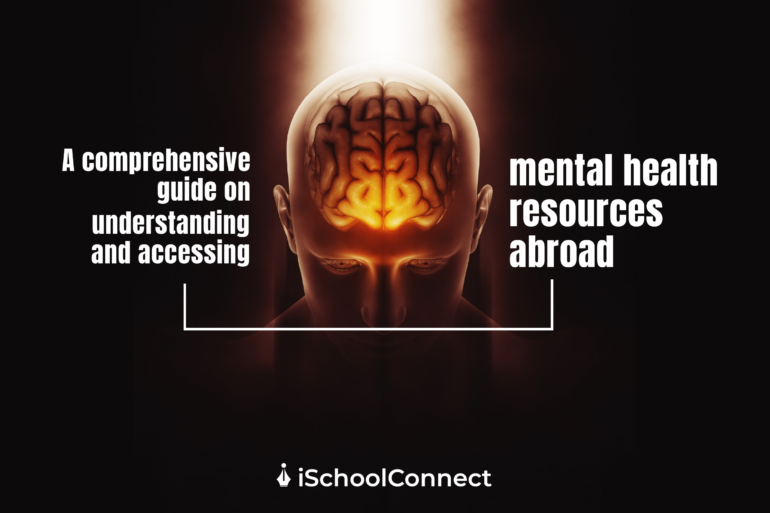Table of Contents
Understanding mental health challenges
Studying abroad can be an exciting and enriching experience, but it can also come with its own set of challenges, including potential impacts on mental health. Being in a new and unfamiliar environment, away from family and friends, can sometimes lead to feelings of isolation, stress, and anxiety. Accessing mental health resources while studying abroad is crucial to ensuring your well-being. Here’s an overview of how to understand and access these resources, but before that let us check the most common causes of mental health problems among international students.
Most common causes of mental health problems with students
International students frequently experience a unique mix of problems that might lead to the development of mental health concerns. Some of the most common causes are as follows.
| Cultural adjustment | The stress of adjusting to a new environment, language, and customs can lead to feelings of isolation, confusion, and anxiety. |
| Isolation and loneliness | Being far from family, friends, and the familiar support system can lead to isolation and loneliness. |
| Academic pressure | The demands of academic studies, especially in a foreign language and unfamiliar educational system, can be intense. |
| Financial stress | Financial strain, including tuition fees, living expenses, and currency exchange rates, can be a significant stressor for international students. |
| Language barriers | Language barriers can also impact academic performance and daily interactions. |
| Discrimination and prejudice | Some international students may face discrimination, racism, or xenophobia in their host countries. |
| Cultural stigma | Cultural stigma may deter international students from getting treatment when experiencing emotional difficulties. |
| Pressure to succeed | International students might feel pressure to excel academically due to their families’ expectations or aspirations. |
| Time zone differences | Communicating with family and friends back home might be challenging due to time zone differences. |
| Lack of familiar support system | Being away from family and close friends means that international students may need to have their usual sources of emotional support readily available. |
| Cultural norms | Different cultural norms regarding social interactions, relationships, and personal boundaries can lead to misunderstandings and discomfort. |
| Homesickness | Feeling homesick is common among international students, especially during holidays or special occasions. |
It’s important to note that while these challenges can contribute to mental health issues, not every international student will experience them similarly.
Understanding mental health resources for study abroad
Adapting to a new environment, dealing with academic responsibilities, and being away from home can all lead to feelings of anxiety and isolation. Understanding and accessing mental health resources is essential for having a pleasant and healthy study abroad experience. Here are some considerations-
Researching ahead
Before embarking on your study abroad adventure, take the time to research the mental health resources available in your host country. Understand the local healthcare system, the types of mental health professionals available, and any cultural attitudes towards mental health and seeking help.
Cultural awareness
Understand that mental health perceptions and approaches can differ from country to country. What is considered normal or taboo might be different in your host country. Learning about the local culture’s attitudes toward mental health can help you navigate conversations and seek help more effectively.
University services

Most universities that host international students offer counseling and mental health services. These services are often familiar with students’ challenges in a foreign environment and can provide culturally sensitive support. Reach out to your host university’s international office or student services to learn about available resources.
Private Therapists/Counselors
If you prefer private counseling, research and identify local therapists or counselors who speak your language and are familiar with the culture. You might want to ensure they have experience working with international students or expatriates.
Language considerations
If the local language is not your native language, ensure you can access mental health professionals who communicate effectively with you. Some universities may offer counseling services in multiple languages, or you might want to explore online therapy options in your preferred language.
Emergency contacts
Know the emergency contact numbers in your host country, including those for mental health crises. Familiarize yourself with the local crisis hotline or mental health services that offer immediate help.
Accessing mental health resources for study abroad

Orientation programs
Many universities conduct orientation programs for international students, which might include information about available mental health resources. Attend these sessions to get a clear idea of how to access support.
Insurance coverage
Check if your student health insurance covers mental health services abroad. If not, consider supplementing your coverage or purchasing additional travel insurance with mental health benefits.
Embassy/Consulate contacts
Before you depart, save the contact information for your country’s embassy or consulate in your host country. They can provide assistance in emergencies or help you navigate local resources, including mental health services.
Online resources
In today’s digital age, online therapy platforms, mental health apps, and resources are widely available and accessible anywhere in the world. These can be particularly valuable if you’re in a location with limited local resources.
Peer and community support
Connect with other international students who may share similar challenges and experiences. Join student clubs, attend orientation events, or engage in online forums to build a supportive network.
Self-cares strategies
Develop self-care routines that help manage stress and maintain mental well-being. Engage in activities you enjoy, prioritize sleep, eat healthily, and exercise regularly.
Emergency plans
Create a mental health emergency plan outlining steps to take if you find yourself in crisis. Share this plan with a trusted friend, family member, or your study abroad program coordinator.
Regular check-ins
Make a habit of checking in with your mental health regularly. Pay attention to any changes in your mood, behavior, or overall well-being, and don’t hesitate to seek help if needed.
Read more: How to Engage Prospective Families of Higher-ed Students
Key takeaways
- Developing a solid support system, seeking help when needed, practicing self-care, and actively engaging in cultural and social activities can all contribute to better mental well-being as an international student.
- Understanding the mental health resources available in your host country and proactively accessing support when needed can maximize your experience while prioritizing your mental well-being.
- Understand that seeking help in good faith is an exhibit of strength and that maintaining good mental health is essential to a fruitful and satisfying study abroad experience.
We hope you found this blog informative and helpful. If you have any thoughts or comments, please share them below. For further information and assistance with your queries related to studying abroad, click here to contact us. We are happy to assist you.
Liked this blog? Read next: University of Sydney | Study here for an enriching experience!
FAQs
Q1. Why is mental health important for students studying abroad?
Ans. Maintaining good mental health is essential for overall well-being and academic success. Studying abroad can bring about feelings of isolation, culture shock, homesickness, and academic pressure, making it crucial to prioritize mental health during this time.
Q2. How can I overcome language barriers when seeking mental health care?
Ans. You can use translation apps to communicate effectively with professionals or seek assistance from your institution’s international office. Also you can ask locals or expats for recommendations on English-speaking professionals.
Q3. What are the most common problems with mental health among students?
Ans. Anxiety, mood, attention, and behavior disorders are the most prevalent mental illnesses in teenagers.






